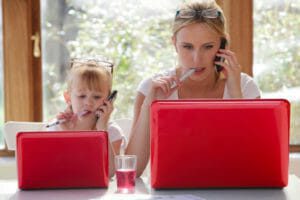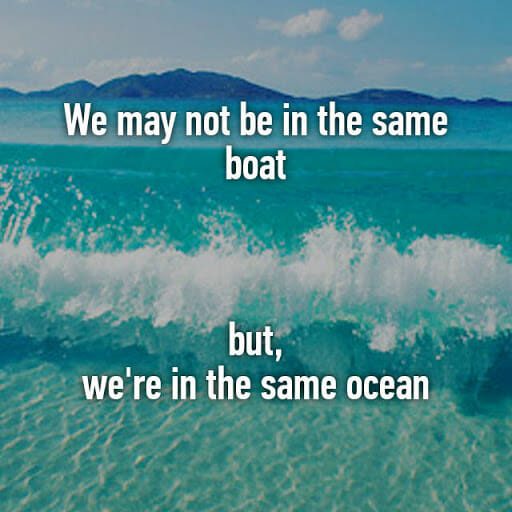Physical Distancing and Social Media

People are taking to social media as way to stay in touch. We all have things to worry about. However, we have different worries and different ways of reacting to it.
Life situation: Everyone is not in the same boat!
The virus is potentially deadly to anyone. It is particularly deadly to elderly and immune compromised people. People feel threatened by this illness, life and death.
To people who would die, if they get it, stories about big gatherings (like to spring break beach party) increases their fear of infection and longer isolation. Pictures of empty supermarket shelves are not helping anyone, either.
Work life varies wildly.
As of February, this year — before the emergency — nearly half (49 percent) of all Americans expect to live paycheck to paycheck in 2020. More than half (53 percent) have no emergency fund. (source)
Work from home.
Some people switched to working at home. They will have no immediate disruption of income. Others are on salary and will have no economic disruption for now, or for the foreseeable future.
Some will run out of work, as customers and clients postpone or cancel business. Their companies may be headed for economic danger.
 How do parents work and do childcare? Parents of school-aged children are in a time-crunch. Working mothers carry the brunt of this.
How do parents work and do childcare? Parents of school-aged children are in a time-crunch. Working mothers carry the brunt of this.
No work.
Face-to-face and high-touch businesses are closing. Day cares, physical therapy offices, alternate healthcare offices, hair and nail salons, theaters, movie houses, musical venues are closed. Retail is closing because of lack of customers and also requirements for cleaning. Although some restaurants are open for takeout and delivery, their businesses will take a hit. Airlines, tourism, and conference business is closed, and will suffer in 2020. For workers, some have no income now, and will have no income when this is over.
Too much work. Some danger.
For people in essential positions, work goes on. Healthcare workers, journalists, retail workers in supermarkets and pharmacies are going to work and being exposed to people who may be infected. They need to balance the need for income with the danger of bringing a virus home and with their commitment to their professions.
How to be kind to others
Don’t assume that everyone is in your boat.
I see people getting into fights online because they assume that they are posting to people just like them. No matter how homogeneous your social media crowd is, you don’t know who feels financial or physical danger.
Don’t boast about leisure time. Not everyone has it.
Someone posted that they are thrilled to have some enforced quality time with their children. They were happily making plans for a staycation. This upset a medical worker who commented how they were working furiously to gear up for the crisis that is coming. Their children are at home, they have no daycare, they fear what is ahead…much stress.
How could this be handled better?
Instead of being gleeful, the first writer could have asked, “I want to make the most of the extra time I’ll be spending with my children, any ideas?”
If you do have leisure time, offer it to others. Gather resources for others (online or shopping for people who should not go out at all).
Don’t police other people’s behavior.
Everyone is getting a flood of information and choosing behaviors about how to be safe. Policing comments come out of fear. They quickly morph into judgment. The judgement goes both ways; very cautious people are “panicking” and people skirting restrictions are “reckless.”
I am seeing fights break out about what is the right thing to do, with accusations that people who do other things are panicking or being reckless.
Instead, adopt a plan for you and your household. It may change, as information changes and government restrictions change. Keep your indoor environment as safe as you can make it. Online, adopt an attitude of “You do you, and I will do me” for anyone outside your household. No one deserves to get this illness. Every adult gets to decide their level of prevention, within the bounds of legal restrictions placed by public health officials.
Humor or no humor?
Humor helps most people. If you need humor, seek it out. Find your tribe online. Seek out books, television, video that will lighten your mood.
Medical information or no gory details?
Some people want all the information, as it comes out. However, others get overwhelmed by it. This is an emergency. That makes media a moving target. Here are some guidelines from On The Media on how to sort data when an emergency is unfolding.
Making occasions
There are online events planned. Look around for them. Authors are reading their children’s books; there are mini-concerts scheduled. There are classes, guided meditations, community Zoom or Google Hangout meetings, religious services, and streamed TV or video.
If you are working from home, plan to end work at a certain time to join in on something other than work, stress, and waiting to figure out if you are sick, or not.
Good luck to us all.
